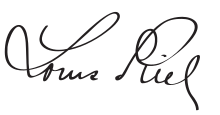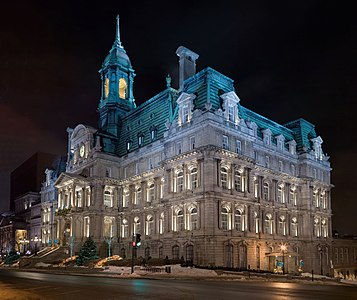Portal:Canada
| Showcase | Content | Contributing |
Introduction
Canada is a country in North America. Its ten provinces and three territories extend from the Atlantic Ocean to the Pacific Ocean and northward into the Arctic Ocean, making it the world's second-largest country by total area, with the world's longest coastline. Its border with the United States is the world's longest international land border. The country is characterized by a wide range of both meteorologic and geological regions. It is a sparsely inhabited country of 40 million people, the vast majority residing south of the 55th parallel in urban areas. Canada's capital is Ottawa and its three largest metropolitan areas are Toronto, Montreal, and Vancouver.
Canada is a parliamentary democracy and a constitutional monarchy in the Westminster tradition. The country's head of government is the prime minister, who holds office by virtue of their ability to command the confidence of the elected House of Commons and is "called upon" by the governor general, representing the monarch of Canada, the ceremonial head of state. The country is a Commonwealth realm and is officially bilingual (English and French) in the federal jurisdiction. It is very highly ranked in international measurements of government transparency, quality of life, economic competitiveness, innovation, education and gender equality. It is one of the world's most ethnically diverse and multicultural nations, the product of large-scale immigration. Canada's long and complex relationship with the United States has had a significant impact on its history, economy, and culture.
A developed country, Canada has a high nominal per capita income globally and its advanced economy ranks among the largest in the world, relying chiefly upon its abundant natural resources and well-developed international trade networks. It is recognized as a middle power for its role in international affairs, with a tendency to pursue multilateral and international solutions. Canada's peacekeeping role during the 20th century has had a significant influence on its global image. Canada is part of multiple international organizations and forums. (Full article...)
Featured article -
Canadians (French: Canadiens) are people identified with the country of Canada. This connection may be residential, legal, historical or cultural. For most Canadians, many (or all) of these connections exist and are collectively the source of their being Canadian. (Full article...)
Featured biography -

Louis Riel (/ˈluːi riˈɛl/; French: [lwi ʁjɛl]; 22 October 1844 – 16 November 1885) was a Canadian politician, a founder of the province of Manitoba, and a political leader of the Métis people. He led two resistance movements against the Government of Canada and its first prime minister John A. Macdonald. Riel sought to defend Métis rights and identity as the Northwest Territories came progressively under the Canadian sphere of influence. (Full article...)
Selected panorama -
National symbol -
The Canada goose (Branta canadensis), sometimes called Canadian goose, is a large wild goose with a black head and neck, white cheeks, white under its chin, and a brown body. It is native to the arctic and temperate regions of North America, and it is occasionally found during migration across the Atlantic in northern Europe. It has been introduced to France, the United Kingdom, Ireland, Finland, Sweden, Denmark, New Zealand, Japan, Chile, Argentina, and the Falkland Islands. Like most geese, the Canada goose is primarily herbivorous and normally migratory; often found on or close to fresh water, the Canada goose is also common in brackish marshes, estuaries, and lagoons. (Full article...)
Selected vital article -
The military history of Canada comprises hundreds of years of armed actions in the territory encompassing modern Canada, and interventions by the Canadian military in conflicts and peacekeeping worldwide. For thousands of years, the area that would become Canada was the site of sporadic intertribal conflicts among Aboriginal peoples. Beginning in the 17th and 18th centuries, Canada was the site of four major colonial wars and two additional wars in Nova Scotia and Acadia between New France and British America; the conflicts spanned almost seventy years, as each allied with various First Nation groups. (Full article...)
Selected picture -
Current events
- April 12, 2024 – War in Sudan
- Canada pledges $132.2 million dollars to Sudan to help people affected by the country's ongoing humanitarian crisis. (Global News)
- April 1, 2024 – Israel–Hamas war
- Seven volunteers from the World Central Kitchen, including six British, Polish, Australian and Palestinian nationals and a dual American-Canadian citizen, are killed in an Israeli airstrike south of Deir el-Balah. (Al Jazeera)
- March 31, 2024 – Haitian crisis
- Canada deploys 70 members of its armed forces to Jamaica to train peacekeepers for a future intervention in Haiti. (CBC News)
- March 9, 2024 – Israel–Hamas war
- Canada and Sweden resume funding for UNRWA, which had been suspended following the UNRWA October 7 controversy. (BBC News)
- March 6, 2024 – Killing of the Wickramasinghe family
- A Sri Lankan family, of four children and their mother, are killed with the father injured in a mass stabbing at a residence in the suburb of Barrhaven, in Ottawa, Canada. A young man is arrested. (CBOT-DT)
- February 28, 2024 –
- The Canadian government releases its report into the high-profile firings of two scientists from the National Microbiology Laboratory in Winnipeg, Manitoba, in 2021, stating that the pair worked closely and covertly with the Chinese government. (National Post)
Did you know -

- ... that journalist Charles Edwards relayed a report by The Canadian Press on the torpedoing of SS Athenia without comment, even though his father was aboard the ship?
- ... that Carrie Jenkins Harris, the North American writer who died in 1903, should not be confused with Carrie Jenkins Harris, the North American writer and editor who died in 1903?
- ... that Canadian doctor James Maskalyk's book Six Months in Sudan was based on his blog?
- ... that John Neilson, a Scottish immigrant to Lower Canada, became a major publisher and bookseller, and was reportedly "the largest consumer of paper" in the country?
- ... that a journalists' poll rated Billy Fitzgerald the second-best Canadian lacrosse player of the first half of the 20th century?
- ... that a year after becoming the first woman president of the Canadian Political Science Association, Caroline Andrew moderated the first Canadian leaders' debate on women's issues?
- ... that the shores of Kesagami Lake in Kesagami Provincial Park (northern Ontario, Canada) are surrounded by "exceptional" peat cliffs reaching 4 metres (13 ft) in height?
Featured list -
Canada's national parks are protected areas under the Canada National Parks Act, owned by the Government of Canada and administered for the benefit, education, and enjoyment of the people of Canada and its future generations. National parks are administered by Parks Canada, a Crown agency operating under the jurisdiction of the Ministry of Environment and Climate Change. The goal of the national parks system is to set aside lands representing the country's 39 distinct natural regions described in the National Parks System Plan, primarily to protect the ecological integrity of the land, and secondarily to allow the public to explore, learn about and enjoy Canada's natural spaces. (Full article...)
Main articles
Associated Wikimedia
The following Wikimedia Foundation sister projects provide more on this subject:
-
Commons
Free media repository -
Wikibooks
Free textbooks and manuals -
Wikidata
Free knowledge base -
Wikinews
Free-content news -
Wikiquote
Collection of quotations -
Wikisource
Free-content library -
Wikiversity
Free learning tools -
Wikivoyage
Free travel guide -
Wiktionary
Dictionary and thesaurus































